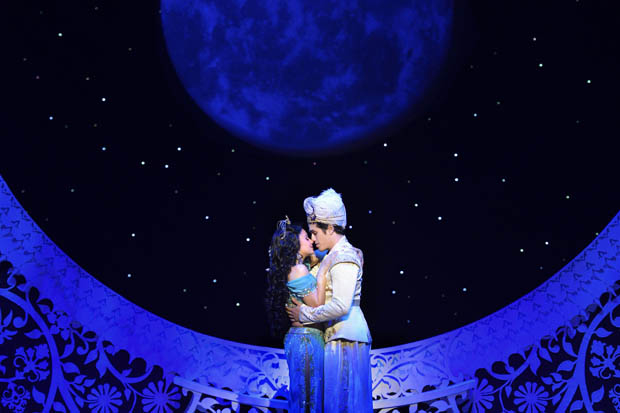Aladdin

(© Deen van Meer)
There’s a reason Aladdin is Disney’s best animation-to-stage effort, and that reason is Tony Award-winning director and choreographer Casey Nicholaw. His work on shows like The Book of Mormon and Spamalot have honed his ability to bring just the right balance of comedy, razzmatazz, and heart to Aladdin's bag of tricks.
Nicholaw’s success with Aladdin, now in its fourth year on Broadway and with the national tour, which launched earlier this year, has everything to do with his light, energetic touch and his ability to find humor that can appeal to children and adults.
Aladdin is such a throwback to good, old-fashioned musical comedy that it will even please Disney skeptics. There’s a little razzle-dazzle, some hummable tunes, and a modern sensibility infusing a Middle Eastern fairy tale that ended up in The Arabian Nights even if it didn’t begin there.
Aladdin is the story of overcoming one’s origins — Aladdin is a poor teenage boy attempting to rise above his "street rat orphan" life, while a princess named Jasmine conceals her royal identity in an attempt to live her life outside the constraints of the palace. The pair meet and soon fall in love. The catalyst for change comes in the form of magic, specifically a genie in a bottle, who grants Aladdin three wishes for helping him escape from the prison of his lamp. Aladdin promises Genie his freedom if the first two wishes successfully win Jasmine’s heart, but there’s resistance from dastardly royal vizier Jafar and his henchman Iago (a parrot in the movie but a human onstage). Certain he’d have Jasmine for himself so he could rule the land with an evil, moustache-twirling hand, Jafar now must contend with a streetwise nobody with a genie in tow.
Adam Jacobs charms as Aladdin, especially when paired with Isabelle McCalla, who plays Jasmine, the defiant princess who will not allow herself to be an object given away by a father or won by a man. Their duet on "A Whole New World" would be lovely enough if they simply sang it to each other center stage, but this being Disney, the song is sung as it should be, while taking a magic carpet ride. The carpet flying is equally as impressive in a how'd-they-do-that way on tour as it was on Broadway.
Anthony Murphy attempts to put his own stamp on the outsize role of the Genie, and he certainly delivers the goods in the showstopper "Friend Like Me." But vocally and comically, he can be hit and miss — though pulling out a Golden State Warriors baseball cap at the top of the show quickly endeared him to the audience.
Unlike other Disney film-to-stage attempts, the new material captures the tone of the movie. The book by Chad Beguelin, who also augments the original lyrics by Howard Ashman and Tim Rice, can traffic in OMG and BFF slang and make dozens of bad food jokes, but it still maintains enough dignity to deliver a solid love story. The new songs ("These Palace Walls," "Diamond in the Rough," "Somebody’s Got Your Back"), with lyrics by Beguelin and music by Menken, are just fine, but the treat here is the chance to hear the songs that Menken and Ashman sketched out for the movie toward the end of Ashman’s life.
"Proud of Your Boy," a ballad for Aladdin that addresses his dead mother, is effective, as are the comedy songs "Babkak, Omar, Aladdin, Kassim," an ode to bromance, and "High Adventure," a sword-swinging swashbuckler robustly performed by Aladdin’s pals (Zach Bencal as Babkak, Philippe Arroyo as Omar, and Mike Longo as Kassim).
Set designer Bob Crowley evokes a fairy tale Middle East in his handsome sets, with the interior of a treasure-filled enchanted cave being particularly spectacular. But it’s the sparkling, jewel-toned costumes — Vegas by way of Agrabah — by Gregg Barnes that elevate the production to the level of delicious spectacle.
In the realm of musical theater, Aladdin falls happily into that zone occupied by so many crowd-pleasing, well-made, and tuneful shows from the 1950s. Its aim is to amuse, engage, and entertain, and it does so with efficient skill. This is a magic carpet ride built to last for decades.











